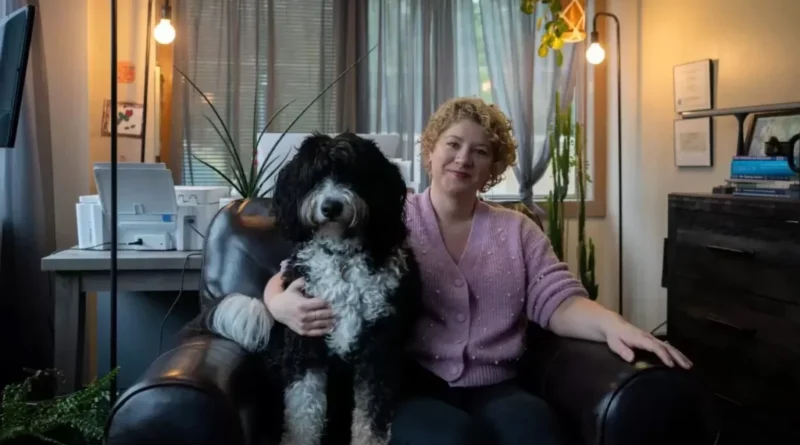Many Alaska families face political differences. A therapist discusses how to address them.
Living in America right now can feel like you and your dad are trying to fix a car, but you can’t even agree on where the engine is. And neither one of you can fathom how the other could’ve been so wrong this whole time and still drive a car. So you’re glaring at each other, white-knuckling a wrench — and the car’s still broken.
It’s not just you. The Pew Research Center says the political and ideological divide in the U.S. is wider now than it’s been in decades. And in a small town in Alaska — especially one you can’t drive away from — it can feel like there’s no escaping the conflict.
Ketchikan has seen a lot of demonstrations lately. There have been protests and rallies against and for the federal government, the mass firings, abortion, and just Donald Trump in general.
When I talked to people at the protests and rallies, though, one thing stood out. Lots of people talked about resenting people they love because of their politics. They talked about how much it sucks, and how exhausted they feel.
Believe it or not, reporters feel that tension too. So I fired off some emails to family therapists in town. “I need your expertise on navigating pressure points,” I wrote.
I told them I wasn’t comfortable with how reactive and angry I felt, and I didn’t think I was alone. I said I wanted to know if there was a way to not feel that way.
One therapist responded immediately.
“I believe there are a few of us who would appreciate talking about this topic,” she wrote. “It’s certainly at the forefront of my life currently, both with clients and personally.”
_______
Caitlin Andrews has tea and a noise machine in her waiting room. Her enormous therapy dog, Guinness, snoozed in a big armchair next to me while we talked.
Andrews’ practice is called Oilean Wellbeing – that’s Irish for “Island.” She says that in a small island town like Ketchikan, the cavernous political divide “just feels really heavy.” And she says alienation from others in the community is something her clients have been experiencing more and more.
“This is huge. I mean, the week of the elections, that was all my clients talked about. It was affecting everyone in one way or another – whether arguments with their family, not seeing eye to eye, or feeling like their household was going to be affected,” she said. “Those are all really, real things that I think therapists across the country are faced with right now.”
Andrews is a family therapist and works with people across the political spectrum. Many of her clients are teenagers and their families. She says when it comes to religion and politics, everyone needs supportive people to talk to.
“Find the people that you can have constructive, healthy discussions with,” she said. “It’s sad that it can’t be, like, the people you’ve always had in your life — but that’s just life.”
Andrews says it’s normal to feel anger towards the people closest to you, but we should ask ourselves what’s under the surface.
“Anger is not ever by itself. It’s a secondary emotion. There’s always something causing anger,” she said.
None of this is simple. Andrews says it’s important to stand up for what you believe in, but if you care about the other person, it matters how you do it.
“The important part is being able to circle back and talk about that,” she said. “If they’re emotionally mature enough and saying ‘Hey, I want to talk about what happened with our conversation.”
Still, it’s easy for both people in a political argument to take it as a personal attack.
“Especially with family, sometimes people have a hard time separating what they’re supporting versus it being about them,” Andrews said. “Sometimes, when we are upset with another person, it’s projecting something like rejection.”
And Andrews says that sometimes, protecting yourself can mean drawing a line and taking painful topics off the table.
“Go in prepared to say, ‘This is getting ugly, and I love you too much. We’re gonna have to stop talking about this topic,’” she said. “That’s a boundary.”
Some degree of pain is often built into the foundations of family relationships, but Andrews doesn’t advocate for her clients to tear it all down.
“It’s not all or nothing,” she said “I don’t think you have to cut someone off, but you have to really protect yourself.”
She says her clients often feel powerless, like no one is listening. But she told me that I’d already done step one: acknowledging I have a problem.
“That can sometimes be the hardest part,” she said. “A lot of people don’t take that responsibility. People come to me because they want to get better.”
And Andrews believes there’s one thing everyone can control: their reactions to the headlines and the people in their lives who may read them differently. And she says that’s a good place to start.

